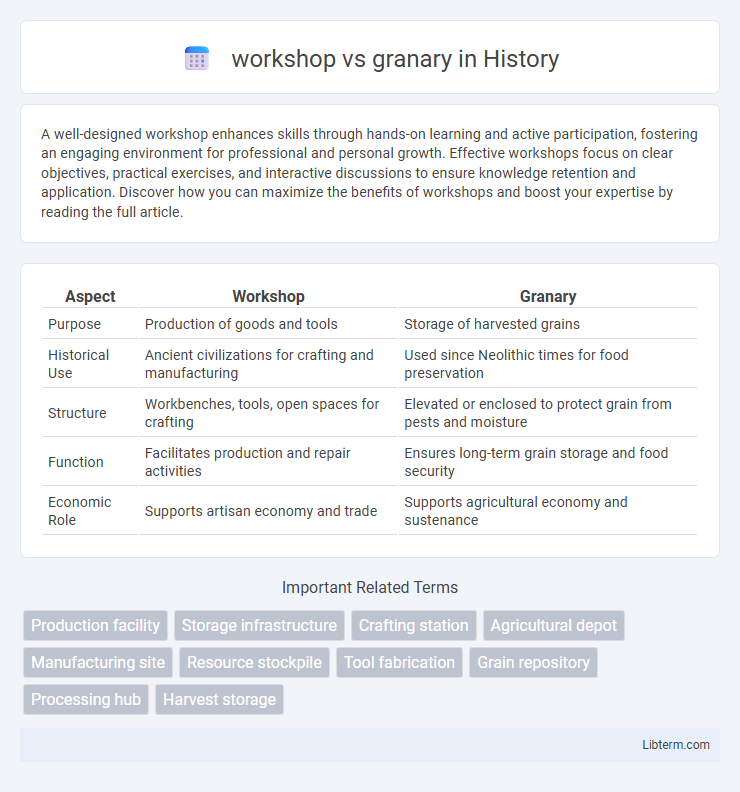A well-designed workshop enhances skills through hands-on learning and active participation, fostering an engaging environment for professional and personal growth. Effective workshops focus on clear objectives, practical exercises, and interactive discussions to ensure knowledge retention and application. Discover how you can maximize the benefits of workshops and boost your expertise by reading the full article.
Table of Comparison
| Aspect | Workshop | Granary |
|---|---|---|
| Purpose | Production of goods and tools | Storage of harvested grains |
| Historical Use | Ancient civilizations for crafting and manufacturing | Used since Neolithic times for food preservation |
| Structure | Workbenches, tools, open spaces for crafting | Elevated or enclosed to protect grain from pests and moisture |
| Function | Facilitates production and repair activities | Ensures long-term grain storage and food security |
| Economic Role | Supports artisan economy and trade | Supports agricultural economy and sustenance |
Understanding the Purpose: Workshop vs Granary
A workshop serves as a designated space for crafting, assembling, or repairing goods, emphasizing hands-on activities and skill development. In contrast, a granary is designed for the storage and preservation of harvested grains, ensuring protection from pests, moisture, and decay. Understanding the distinct roles highlights how workshops optimize production processes while granaries secure agricultural resources.
Key Functions and Uses of Workshops
Workshops primarily function as specialized spaces for manufacturing, repairing, and crafting goods, equipped with tools and machinery for activities like woodworking, metalworking, and electronics assembly. They serve as centers for prototyping, skill development, and small-scale production, enabling artisans and technicians to transform raw materials into finished products. Unlike granaries, which are designed for the storage and preservation of agricultural produce such as grains, workshops emphasize hands-on creation and innovation in industrial and artisanal processes.
Essential Roles of Granaries in Storage
Granaries play an essential role in agricultural storage by providing a secure and controlled environment for preserving harvested grains, protecting them from pests, moisture, and spoilage. Unlike workshops, which are primarily focused on manufacturing or repair activities, granaries are specifically designed to maintain the quality and longevity of stored cereals and seeds. Effective granary management ensures food security, stable supply chains, and reduces post-harvest losses critical for both local consumption and commercial markets.
Structural Differences: Workshop and Granary
Workshops typically feature open floor plans with large windows and ventilation openings designed for ease of movement and enhanced airflow, facilitating various crafting or manufacturing activities. Granaries are constructed with thicker, insulated walls and elevated floors to protect stored grains from moisture, pests, and temperature fluctuations. The structural differences reflect their functions: workshops prioritize accessibility and workspace, while granaries emphasize storage security and preservation.
Material Requirements for Each Facility
Workshops primarily require raw materials such as wood, metal ores, and crafting tools to produce finished goods and equipment, emphasizing the need for diverse resource inputs like iron bars, timber, and cloth. Granaries, in contrast, depend heavily on agricultural products including grains, seeds, and harvested crops to store and preserve food supplies for settlements. Efficient resource allocation for workshops centers around processed materials and specialized components, while granaries focus on bulk storage capacity and maintaining crop integrity through proper moisture control.
Impact on Community Economy
Workshops generate local employment by producing crafted goods that stimulate small-scale trade and skill development within the community. Granaries stabilize food supply by storing surplus crops, reducing post-harvest losses, and ensuring food security during lean seasons, thus maintaining economic resilience. Together, workshops and granaries contribute to a balanced economy by supporting both income generation and resource management.
Efficiency and Productivity Comparisons
A workshop facilitates higher productivity by enabling skilled labor to produce diverse, high-quality goods efficiently through specialized tools and techniques. In contrast, a granary serves primarily as a storage facility, optimizing resource management but not directly contributing to production output. Efficiency in workshops is measured by output quality and speed, while granaries focus on preserving and organizing resources to support sustained productivity across seasons.
Maintenance Needs and Longevity
Workshops require regular maintenance to ensure tool functionality and workspace safety, often involving cleaning, lubrication, and repairs to machinery, which directly influences their operational longevity. Granaries demand consistent upkeep to prevent moisture buildup, pest infestation, and structural decay, critical factors in preserving stored grain quality and extending the facility's lifespan. Proper maintenance protocols tailored to each facility type significantly enhance durability and reduce long-term operational costs.
Safety Considerations: Workshop vs Granary
Workshops require stringent safety measures to prevent accidents involving machinery, electrical equipment, and flammable materials, emphasizing proper ventilation, protective gear, and fire extinguishers. Granaries prioritize safety through pest control, moisture management, and structural integrity to prevent grain spoilage, contamination, and collapse hazards. Both environments demand regular inspections and adherence to safety regulations tailored to their specific risks.
Choosing the Right Facility for Your Needs
Selecting between a workshop and a granary depends on your specific requirements: workshops are ideal for crafting, repairs, and hands-on projects, equipped with tools and workbenches designed for productivity and creativity. Granaries serve as specialized storage solutions for grains, featuring moisture control and pest prevention systems to safeguard agricultural produce. Understanding the primary functions and environmental needs of each facility ensures you choose the right structure to optimize efficiency and protect valuable resources.
workshop Infographic

 libterm.com
libterm.com